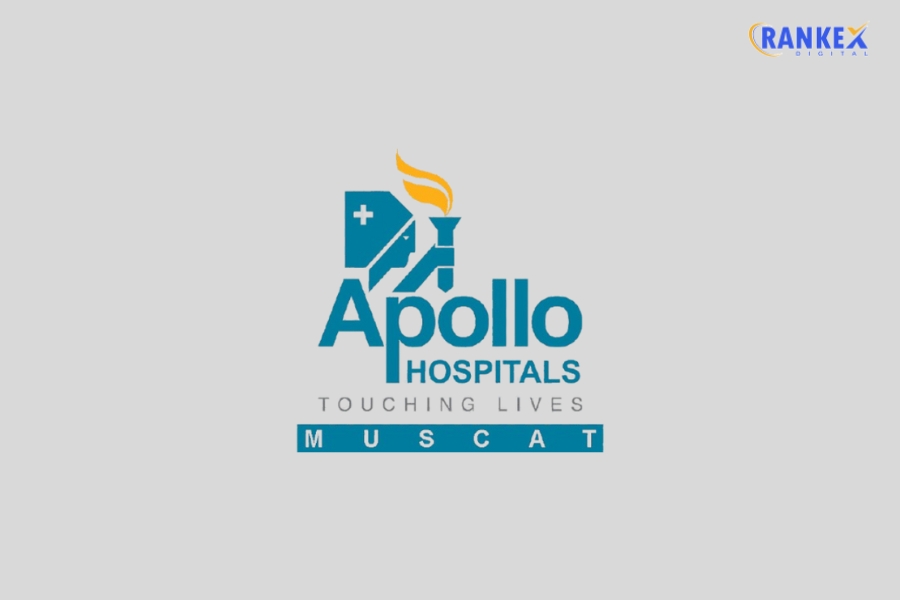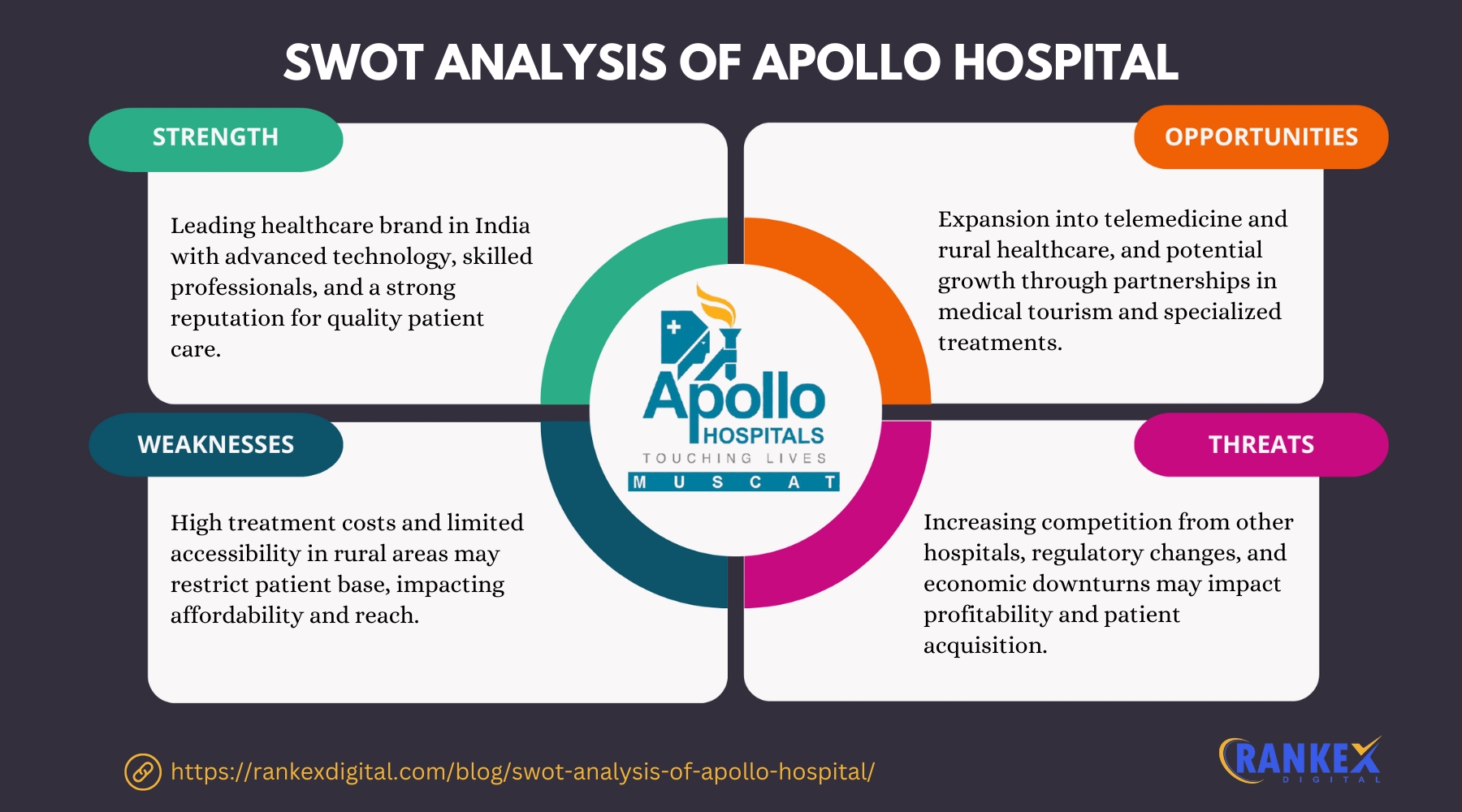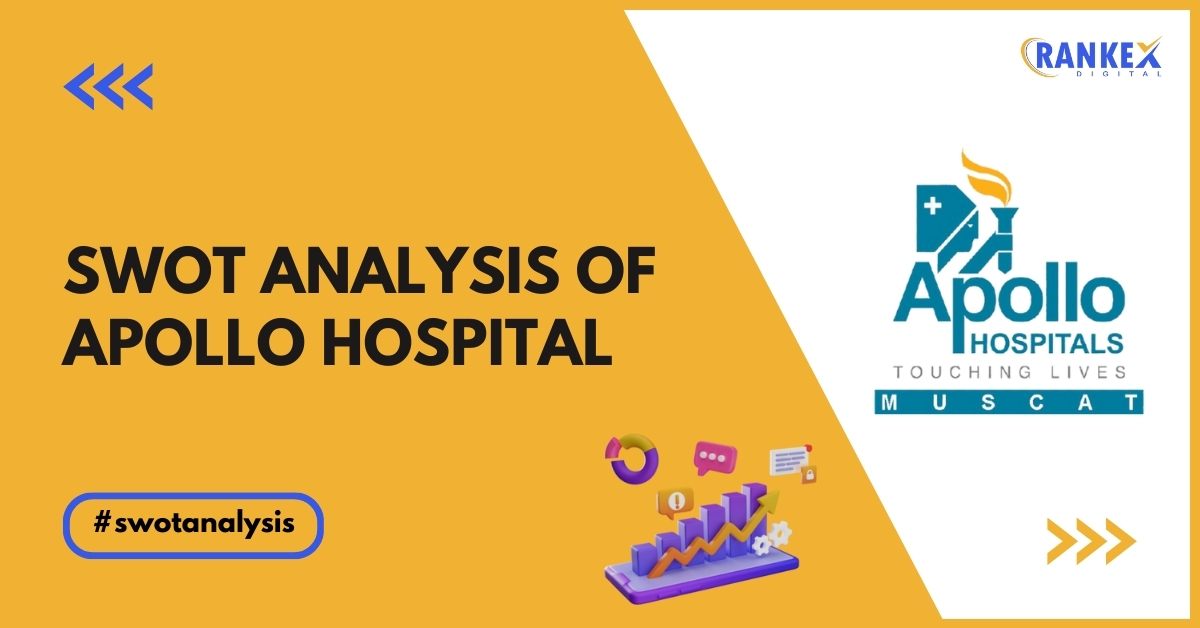Apollo Hospital is one of the largest healthcare groups in Asia, renowned for its world-class medical facilities and pioneering healthcare services in India and beyond. With a legacy spanning decades, Apollo Hospital has transformed healthcare in India by integrating advanced medical technology, quality care, and a focus on patient satisfaction.
Analyzing the strengths, weaknesses, opportunities, and threats or SWOT analysis of Apollo Hospital is crucial for understanding its market positioning and the challenges it faces. This analysis will explore the key aspects that contribute to Apollo Hospital’s success and the potential growth areas in the highly competitive healthcare sector.
Table of Contents
Overview of Apollo Hospital

Apollo Hospital was established in 1983 by Dr. Prathap C. Reddy, who aimed to revolutionize Indian healthcare by offering high-quality, affordable medical services. Headquartered in Chennai, Tamil Nadu, Apollo Hospital has grown into a massive network with over 70 hospitals, 4,000 pharmacies, and 100 telemedicine centers across India.
Apollo Hospital has also established itself as a global player in healthcare, serving millions of patients from over 120 countries each year.
Quick Stats About Apollo Hospital
| Attribute | Description |
|---|---|
| Founder | Dr. Prathap C. Reddy |
| Year Founded | 1983 |
| Origin | Chennai, Tamil Nadu, India |
| Number of Employees | 60,000+ |
| CEO | Ms. Suneeta Reddy |
| Type of Hospital | Private |
| Annual Revenue | $3.5 Billion |
| Patient Care Volume | 120+ Countries |
Current News of Apollo Hospital
- Telemedicine Expansion: Apollo Hospital has been expanding its telemedicine services, making healthcare accessible in remote areas.
- Digital Healthcare Initiatives: Apollo has launched its healthcare platform “Apollo 24|7,” allowing patients to access medical consultations, online pharmacy services, and diagnostic lab bookings.
- International Collaborations: Apollo Hospital has partnered with international healthcare institutions to exchange medical expertise and improve treatment outcomes.
- Expansion into New Markets: Apollo continues to expand its presence by setting up new hospitals and clinics across India and in other countries.
SWOT Analysis of Apollo Hospital

Strengths
- Strong Brand Reputation: Apollo Hospital, with its decades-long presence, has built a strong and trusted brand known for providing top-tier medical services. This established reputation draws patients seeking quality care, both within India and internationally.
- Comprehensive Network: Apollo has created a wide-reaching healthcare network, encompassing hospitals, pharmacies, and telemedicine services. This extensive network allows them to deliver healthcare access to urban centers and, to some extent, rural communities.
- Highly Skilled Medical Staff: The hospital boasts a team of highly qualified doctors, nurses, and specialists. Many of these healthcare professionals have received training internationally, ensuring Apollo’s medical staff is adept in advanced treatments and procedures.
- Advanced Medical Technology: Apollo consistently invests in cutting-edge technology, such as robotic-assisted surgeries, minimally invasive techniques, and AI-driven diagnostic tools. This commitment to technology helps the hospital stay at the forefront of medical advancements, offering patients effective and efficient care.
- Diverse Service Portfolio: Apollo provides a comprehensive array of healthcare services, from preventive care and diagnostics to complex surgeries and post-operative care. This range caters to a broad spectrum of health needs and age groups, enhancing Apollo’s appeal as a one-stop healthcare provider.
Weaknesses
- High Treatment Costs: Apollo’s premium services, cutting-edge technology, and high-quality facilities contribute to the high costs of treatment. This can be prohibitive for lower-income patients and may limit Apollo’s accessibility to a wider population.
- Dependence on Urban Markets: While Apollo has an extensive network, it predominantly serves urban areas. This focus on urban locations leaves rural areas underserved, missing potential opportunities in those regions where quality healthcare is often sparse.
- Limited Focus on Primary Healthcare: Apollo places a significant emphasis on specialized and tertiary care, such as complex surgeries. However, primary and preventive healthcare services are not as prominent in its offerings, which could limit its reach in the preventive care market.
- Operational Complexity: Apollo’s large network of hospitals, pharmacies, clinics, and telemedicine services can result in operational inefficiencies. Managing quality control and maintaining consistent standards across the network is a complex challenge that can affect performance.
- Reliance on Specialized Treatments: A substantial portion of Apollo’s revenue comes from specialized and high-end treatments. This reliance makes it vulnerable to shifts in demand for these services or changes in patient preferences, potentially impacting revenue stability.
Opportunities
- Expansion in Rural Areas: There is a considerable need for quality healthcare in rural and underserved areas. Apollo has an opportunity to expand its reach to these areas, possibly through more affordable, smaller-scale facilities or partnerships with local healthcare providers.
- Growth in Telemedicine and Digital Health: The demand for telemedicine has surged, especially post-pandemic. Apollo can capitalize on this trend by scaling up its digital health services, providing consultations, monitoring, and follow-up care remotely, which would increase access across regions.
- Medical Tourism: Apollo Hospital is well-positioned to attract medical tourists due to its reputation for high-quality, affordable healthcare. Enhancing its facilities to accommodate international patients could bring in a significant revenue stream from patients seeking specialized treatments.
- Collaboration with Government Initiatives: Partnering with government healthcare schemes, like Ayushman Bharat in India, can help Apollo improve access to healthcare in underserved areas while strengthening its role in public health.
- Research and Development (R&D): Investing in R&D could allow Apollo to improve healthcare outcomes and innovate new treatments. This would not only enhance patient care but also provide a competitive edge in the industry, positioning Apollo as a leader in medical innovation.
Threats
- Intense Competition: The healthcare market is highly competitive, with other major hospital networks like Fortis, Max Healthcare, and international entrants vying for market share. This competition can put pressure on Apollo’s pricing and profitability.
- Regulatory Challenges: Healthcare is a heavily regulated industry. Changes in healthcare policies or the introduction of new regulations can impact Apollo’s operations, requiring them to adapt to meet compliance standards, which may be costly.
- Economic Fluctuations: Economic downturns can limit patients’ ability to afford healthcare services, which could directly impact Apollo’s revenue. Private healthcare services are especially vulnerable during economic slowdowns.
- Rising Medical Costs: The cost of medical equipment, cutting-edge technology, and skilled healthcare professionals is continually increasing. These rising expenses can impact Apollo’s profitability and may require adjustments in service fees.
- Cybersecurity Risks: With Apollo’s growing reliance on digital health platforms and patient databases, it faces cybersecurity risks. Data breaches or cyberattacks could compromise patient information and potentially damage Apollo’s reputation, impacting patient trust.
Top Competitors of Apollo Hospital
- Fortis Healthcare
- Max Healthcare
- Manipal Hospitals
- Narayana Health
- Medanta – The Medicity
Conclusion
The SWOT analysis of Apollo Hospital highlights its strong brand, extensive network, skilled medical staff, and advanced technology as significant strengths. However, it also faces challenges such as high treatment costs, limited focus on primary healthcare, and operational complexities.
Apollo Hospital has significant growth opportunities in rural healthcare, telemedicine, medical tourism, government collaboration, and R&D investment. However, it must be cautious of threats from competition, regulatory changes, economic fluctuations, rising costs, and cybersecurity risks.
By leveraging its strengths and addressing its weaknesses, Apollo Hospital can further solidify its leadership position in the healthcare industry and expand its reach to provide quality healthcare to a larger population.
Frequently Asked Questions
What are the main strengths of Apollo Hospital?
Apollo Hospital’s strengths include its strong brand reputation, comprehensive healthcare network, skilled medical staff, advanced medical technology, and a diverse range of services.
How does Apollo Hospital manage its high treatment costs?
Apollo invests in high-end technology and specialized treatments, leading to higher costs. However, the hospital has been expanding its telemedicine services and digital health platform, aiming to provide more affordable options.
What opportunities exist for Apollo Hospital in the healthcare sector?
Apollo Hospital has opportunities in rural expansion, telemedicine growth, medical tourism, government collaborations, and investment in healthcare research and development.
What challenges does Apollo Hospital face in terms of competition?
Apollo faces intense competition from other major healthcare providers such as Fortis and Max Healthcare, as well as newer hospitals entering the market with advanced facilities.
How does Apollo Hospital contribute to medical tourism in India?
Apollo Hospital attracts international patients by providing world-class healthcare services at affordable costs, making it a key player in the medical tourism sector in India.











